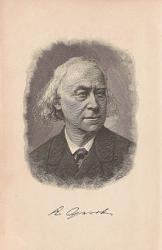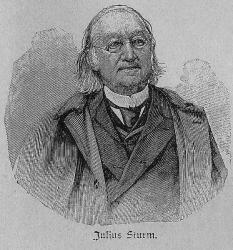Planning worship?
Check out our sister site, ZeteoSearch.org,
for 20+ additional resources related to your search.
- |
User Links
Person Results
‹ Return to hymnal


Export as CSV
Karl Gerok

1815 - 1890 Hymnal Number: 32 Author of "Selig, wer im Weltgebrause" in Der Neue Kleine Psalter Gerok, Karl von, D.D , was born January 30, 1815, at Stuttgart, and studied theology at the University of Tubingen. He was, from 1836 to 1840, assistant at his father's church in Stuttgart; 1840-43, lecturer (repetent) at Tübingen, and after 1844 diaconus at Böblingen, near Stuttgart. In 1849 he returned to preach at Stuttgart, where he now resides (1886), as chief court preacher and oberconsistorialrath (0. Kraus, 1879, p. 165: manuscript from Dr. von Gerok, &c).
Gerok is well known as an eloquent preacher, and has published various volumes of sermons. His fame principally rests on his sacred poetry. The best known of his poetical works is his Palmblätter, 1857, which has attained a wonderful circulation, and reached a 56th edition in 1886. A new series appeared in 1878 as Palmblätter Neue Folge (9th ed., 1885, under the title Auf einsamen Gängen). A series of poems on the Book of the Acts of the Apostles appeared as Pfingstrosen, 1864, (8th ed. 1886). His other poetical works are, Die letzte Strauss, 1885 (5th ed., 1886), Blumen und Sterne, 1867 (11th ed., 1886), and Deutsche Ostern, 1872(6th ed., 1883). The Palmblätter is in four parts: pt. 1 consisting of poems on Holy Words, i.e. mostly founded on sayings of Holy Scripture; pt. ii. on "Holy Times" (Advent, &c); pt. iii. on "Holy Mountains," and pt. iv. on "Holy Waters," i.e. on Mountains and Waters mentioned in Holy Scripture. From it a few centos have passed into some of the recent German hymn-books; and a version apparently including translations of all the poems in the ed. of the German used appeared in English as Palm leaves by Karl Gerok. Translated from the German by J. E. A. Brown. London: Strahan & Co., 1869. A large number of the individual poems have also been tr, by Miss Borthwick (who has also translated a few from the Pfingstrosen), Miss Burlingham, the Revs. Dr. R. Maguire, E, Massie, J. Kelly, and various others. But as none of these versions have passed into English common use, and as the originals are poems and not hymns, we must refer the reader to the works of these translators.
[Rev. James Mearns, M.A.]
-- John Julian, Dictionary of Hymnology
Karl Gerok
Carl Friedrich Paulus
1843 - 1893 Person Name: C. F. Paulus Hymnal Number: 191 Translator of "Dies ist mein Loblied, dies mein Gesang" in Der Neue Kleine Psalter
Carl Friedrich Paulus
Julius Carl Reinhold Sturm

1816 - 1896 Person Name: Julius Sturm Hymnal Number: 91 Author of "Drei Kreuze stehn auf Golgatha" in Der Neue Kleine Psalter Sturm, Julius Carl Reinhold, was born July 21, 1816, at Köstritz, in the principality of Reuss (younger line). After being a student of theology at Jena, from 1837 to 1841, he was for two years a private tutor at Heilbronn on the Neckar, and then, for a year, at Friesen, in Saxony. In 1845 he became tutor to Prince Heinrich xiv. of Reuss; and after the Prince's confirmation, in 1848, acted as tutor to him for three years more at the Gymnasium in Meiningen. He was then appointed pastor at Göschitz, near Schleiz, in the end of 1850; and pastor at Köstritz, in 1858, where he still (1889) lives as Kirchenrath and Court preacher (Koch, vii. 284; ms. from the author, &c). Sturm is one of the most important of modern German sacred poets. Among his works of this nature may be mentioned:—
(1) Gedichte, Leipzig, 1850; 3rd ed., 1862. (2) Fromme Lieder, Leipzig, 1852; 6th ed., 1867. (3) Zwei Rosen, oder das holte Lied der Liebe, Leipzig, 1854: a version of Canticles. (4) Neue fromme Lieder und Gedichte, Leipzig, 1858; 2nd ed., 1870. (5) Israel's Weg zur Herrlichkeit, Erlangen, 1858; 2nd ed., as Israelitische Lieder, Halle, 1867. (6) Von der Pilgerfahrt, Halle, 1868. (7) Gott grüsse dich. Religiöse Gedichte, Leipzig, 1876. (8) Aufwärtz, Leipzig, 1881. (9) Ich bau auf Gott. Neue religiöse Gedichte, Bremen, 1883. (10) Palme und Krone, Bremen, 1888.
From these works a large number of pieces have passed into recent collections of German sacred poetry, and a few into recent German official hymnbooks. A considerable number have been translation by Lady John Manners, the Rev. J. Kelly, and others, but none have passed into English hymnbooks. [Rev. James Mearns, M.A.]
-- John Julian, Dictionary of Hymnology (1907)
Julius Carl Reinhold Sturm
Jessie H. Brown
Hymnal Number: 196 Author of "O rühme die Gnade des Herrn" in Der Neue Kleine Psalter See Pounds, Jessie Brown, 1861-1921
Jessie H. Brown
Wilhelm Ahrens
1811 - 1901 Person Name: W. Ahrens Hymnal Number: 332 Author of "Hier ist nicht mein Vaterland" in Der Neue Kleine Psalter
Wilhelm Ahrens
Friedrich Conrad Hiller
1662 - 1726 Hymnal Number: 410 Author of "O Jerusalem, du schöne" in Der Neue Kleine Psalter
Hiller, Friedrich Conrad, was born at Unteröwisheim, near Bruchsal, in 1662. In 1680 he began the study of law at the University of Tübingen, where he became a licentiate in civil and canon law. He died at Stuttgart, Jan. 23, 1726, where he had been since 1685 advocate in chancery at the ducal court.
His hymns, which found favour in Hannover, and have kept their place in Wtirttemberg, appeared in his Denck-mahl der Erkentniss, Liebe und Lob Gottes, in neuen geistlichen Liedern, &c, Stuttgart, 1711, with melodies by J. G. C. Storl. The only one tranlated into English is:—
O Jerusalem du schöne. Heaven. 1711, as above, p. 535, in 7 stanzas of 6 lines, entitled Longing after Eternal Life. It has been a great favourite in Württemberg, and was included in the Württemberg Gesang-Buch, 1742, and again in that of 1842. The fine melody set to it in 1711 is found in the Sarum Hymnal, 1868, No. 252.
The translations are: (1) "O Jerusalem the golden," by R. Massie, 1864, p. 140, repeated in Reid's Praise Book, 1872. (2) "O Jerusalem! fair dwelling," in J. D. Burns's Memoir and Remains, 1869, p. 256. [Rev. James Mearns, M.A.]
-- John Julian, Dictionary of Hymnology
Friedrich Conrad Hiller
J. B. O. Clemm
1855 - 1927 Hymnal Number: 107 Composer of "[Gelblich weiß die Felder glänzen]" in Der Neue Kleine Psalter James Bowman Overton Clemm
J. B. O. Clemm
Melchior Franck
1559 - 1639 Person Name: Michael Frank Hymnal Number: 335 Author of "Was mich auf dieser Welt betrübt" in Der Neue Kleine Psalter Melchior Franck; b. about 1580, Zittau, Germany; d. 1639, Coburg, Germany
Evangelical Lutheran Hymnal, 1908
Melchior Franck
A. Flammann
Hymnal Number: 105 Translator of "Uns're Garben ein, uns're Garben ein" in Der Neue Kleine Psalter
A. Flammann
Adolph Moraht
1805 - 1884 Hymnal Number: 102 Author of "An deiner Rede will ich bleiben" in Der Neue Kleine Psalter Moraht, Adolph , Ph.D., son of J. D. M. Moraht, merchant in Hamburg, was born at Hamburg, Nov. 28, 1805. From 1825 to 1828 he was a student of theology at the Universities of Halle, Göttingen, and Berlin, graduating Ph.D. at Göttingen in 1828. He was then resident for nine years as a candidate of Theology (licensed preacher) at Hamburg, teaching in private schools, and devoting his spare time to the work of Home Missions. At Easter, 1838, he was appointed second pastor at Mollen, in Lauenburg, and in 1846 chief pastor. He died at Möllen, Dec. 6, 1884 (Koch vii. 296; MS. from his daughter, &c).
His hymns appeared principally in his (1) Harfenklänge (90), Lüneburg, 1840; 2nd ed. (107), Hamburg, 1865. (2) Zweite Sammlung der Harfenklänge (73), Hamburg, 1880. Some of them first appeared in various papers and collections. The best are his hymns of Love to Christ, which are sweet in tone and the fruits of ripe Christian experience. Those which have passed into English are:—
i. Ich bleib bei dir! wo könnt ichs besser haben. Rest in the Lord. 1840 as above, p. 111, in 5 st.; and in O. Kraus, 1879, p. 360, omitting st. v. Translated as "I rest with Thee, Lord! whither should I go," by Miss Borthwick in Hymns from the Land of Luther., 1855, p. 62 (1884, p. 120), and in Miss Warner's Hymns of the Church Militant, 1858, p. 60.
ii. Je kleiner ich, je grösser du. Humility. Founded on St. John iii. 30. 1840, as above (1865, p. 121), in 7 st., and in O. Kraus, 1879, p. 361. Translated as “The less I am, the more Thou art," by J. Kelly, 1885, p. 31.
iii. Wo ist dein Bethel, wo die Himmelspforte. Secret Prayer, 1840, as above, p. 101, in 4 st., and in F. Seinecke's Evangelical Liedersegen, 1862, No. 192. Translated as (1) "Where is thy Bethel, where the world's control," by C. T. Astley, 1860, p. 22. (2) "Where is thy Bethel? where the gate of heaven.” by J. Kelly, 1885, p. 11. [Rev. James Mearns, M.A.]
--John Julian, Dictionary of Hymnology (1907)
Adolph Moraht


 My Starred Hymns
My Starred Hymns


